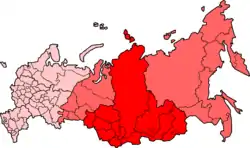Siberia
English

Geographic Russian Siberia in light red, political Siberian Federal District in dark red
Etymology
Adopted in the 17th century, from Russian Сиби́рь (Sibírʹ). In origin the Tatar name of a 14th-century fortress at Qashliq (Tobolsk) which became the capital of the 16th-century Khanate of Sibir, in 16th century Russian usage extended to the entire area of what is now Tyumen Oblast, and with the ongoing Russian conquest of Siberia by the 19th century to the larger area of Russia's Asian territories beyond the Ob River.
The figurative sense in English arises in the 19th century (attested in 1841 according to OED).
Pronunciation
- IPA(key): [saɪˈbɪəɹɪə]
- Rhymes: -ɪəriə
Translations
region of Russia
|
|
Noun
Siberia (plural Siberias) (also siberia)
- (figuratively) a cold, inhospitable place or place of exile
Latin
Romanian
Pronunciation
- IPA(key): [siˈbe.ri.a]
Declension
| gender f | uncountable |
|---|---|
| Nom/Acc | Siberia |
| Gen/Dat | Siberiei |
Spanish
This article is issued from Wiktionary. The text is licensed under Creative Commons - Attribution - Sharealike. Additional terms may apply for the media files.